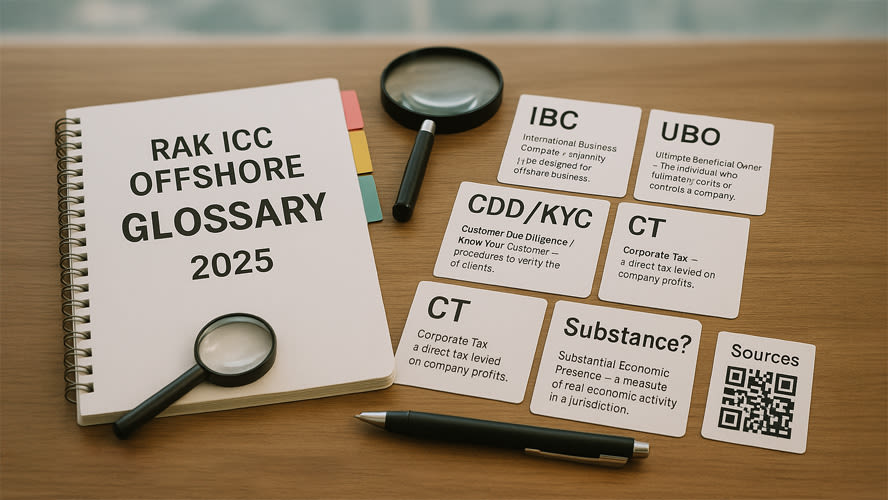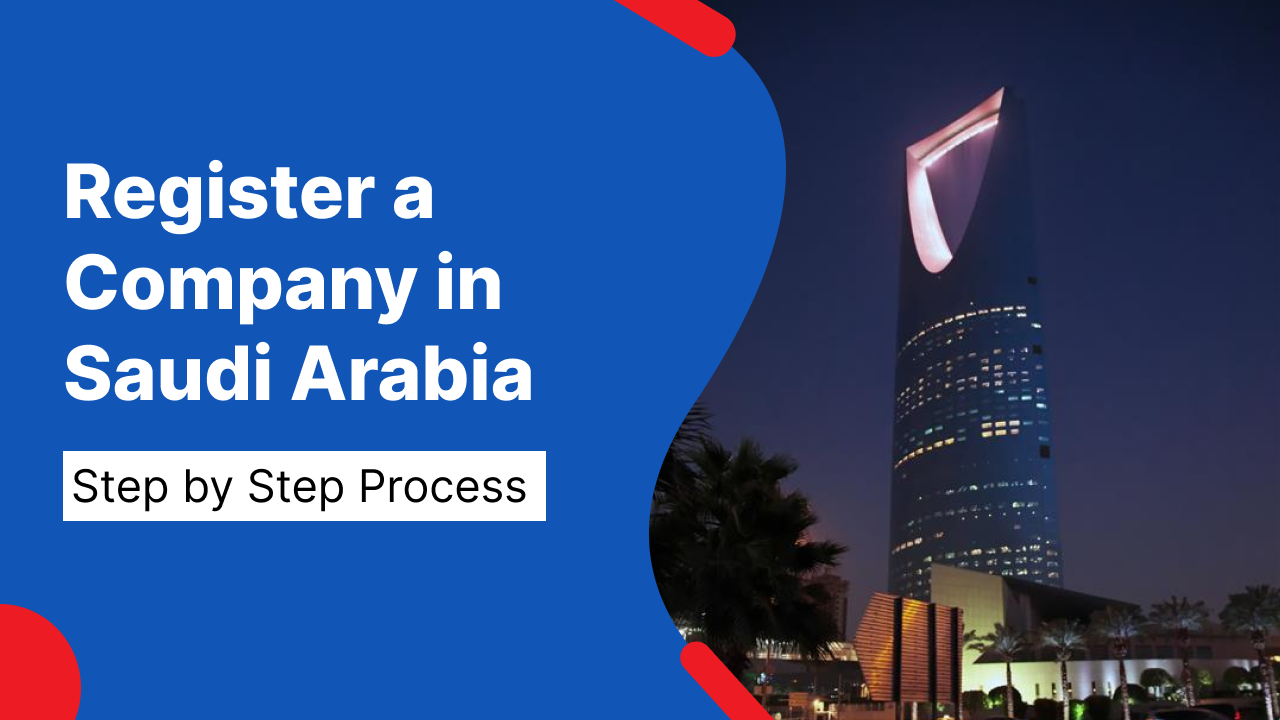
Essential Terms Explained for Offshore Company Formation in the UAE
This glossary gives you clear definitions of key terms related to RAK ICC offshore company formation, with direct links to official sources, helping you understand every key term - from UBO to Economic Substance and Corporate Tax - with clear, up-to-date definitions.
At a Glance
| Term | Meaning |
|---|---|
| RAK ICC Offshore | An international business company registered in Ras Al Khaimah to conduct operations outside the UAE. |
| UBO | Ultimate Beneficial Owner — the real person who owns or controls 25% or more of a company. |
| ESR | Economic Substance Regulations that ensure certain UAE companies have real operations and management presence. |
| CT | Corporate Tax — 9% on business profits exceeding AED 375,000 under UAE Federal Decree-Law No. 47/2022. |
RAK ICC Offshore / IBC
A RAK ICC offshore company is formed under the Ras Al Khaimah International Corporate Centre to manage international business, asset holding, or global investment structures. It must be registered through a licensed Registered Agent and can be incorporated in as little as two working days.
Why it matters:
Entrepreneurs often choose this structure for the peace of mind it offers: security, tax efficiency, and confidentiality for their global business or assets.
Key Facts:
- Setup Time: Around 2 business days
- Business in UAE Mainland: Not permitted
- Registered Agent: Mandatory
Source: RAK ICC Official Website
Registered Agent
A Registered Agent is a licensed professional or firm authorized by RAK ICC to handle company formation, compliance filings, renewals, and record-keeping.
Why it matters:
You cannot form or maintain a RAK ICC company without a registered agent. They serve as your link to RAK ICC and ensure your company remains in good legal standing.
Key Facts:
Jurisdiction: RAK ICC Main Role: Incorporation, renewals, compliance assistance Record Keeping: Minimum 5 years
*Source: RAK ICC Regulations *
UBO (Ultimate Beneficial Owner)
The UBO is the real individual who ultimately owns or controls a company. In the UAE, anyone with 25% or more ownership or control must be registered as a UBO.
Why it matters:
UBO disclosure is a core compliance requirement under UAE anti–money laundering regulations. Banks will not open a corporate account without verified UBO details.
Key Facts:
- Ownership Threshold: 25% or more
- UBO Register: Mandatory by law
- Verification: Required for banking and compliance
Source: UAE Cabinet Decision No. 109 of 2023
ESR (Economic Substance Regulations)
The Economic Substance Regulations (ESR) ensure that companies performing certain activities — such as holding, distribution, or financing - have genuine economic presence in the UAE.
Why it matters:
Companies must demonstrate real operations, employees, and expenditure in the UAE to meet ESR compliance. Non-compliance can result in penalties or license suspension.
Key Facts:
Reporting: Annual notification and ESR report Covered Activities: 9 sectors defined by UAE law Evidence: Real operations, staff, and office space
Source: UAE Ministry of Finance
CT (Corporate Tax)
The UAE Corporate Tax (CT) applies a 9% rate on profits exceeding AED 375,000, under Federal Decree-Law No. 47 of 2022.
You can still get the 0% tax rate. For Qualifying Free Zone Entities, it all comes down to staying compliant and ensuring your business activities fit the criteria.
Why it matters:
Here's a key point: even with an offshore or free zone company, your tax bill depends on where your income is generated. It's crucial to know if your money is made locally or internationally.
Key Facts:
- Tax Rate: 9% above AED 375,000
- Free Zone Benefit: Possible 0% rate
- Law: Federal Decree-Law No. 47/2022
*Source: UAE Ministry of Finance – Corporate Tax *
CDD / KYC (Customer Due Diligence / Know Your Customer)
Think of CDD and KYC as a bank's formal handshake. They need to know who they're dealing with and what your business does. It’s how they keep everyone safe from money laundering.
Why it matters:
A RAK ICC offshore company must complete detailed KYC and due diligence for opening a bank account in the UAE offshore.
Key Facts:
- UBO Verification: Required
- Proof of Funds: Must be documented
- Screening: Includes sanctions and politically exposed persons (PEP) checks
Source: Central Bank of the UAE
Company Name Rules
RAK ICC applies strict guidelines to ensure company names are appropriate and compliant. Certain words, like ‘Bank’, ‘Insurance’, or ‘Trust’, cannot be used unless the company holds a valid licence for that activity.
Why it matters:
A non-compliant name can delay company registration or result in rejection during approval.
Key Facts:
- Restricted Words: Bank, Insurance, Trust, etc.
- Name Reservation: Valid for 3 years
- Pre-Approval: Mandatory
Source: RAK ICC Naming Guidelines
Frequently Asked Questions
What is a UBO in the UAE?
A UBO (Ultimate Beneficial Owner) is any person who owns or controls 25% or more of a company’s shares or has significant influence over management.
Do RAK ICC companies pay corporate tax?
They may qualify for 0% tax if they meet Free Zone conditions and comply with the UAE’s corporate tax law.
What is Economic Substance Reporting?
It’s an annual requirement for certain companies to demonstrate they have real operations, employees, and management in the UAE.
Can I change my Registered Agent?
Yes. RAK ICC allows company transfers between registered agents through a record transfer request.
Need Assistance?
Our team helps investors and entrepreneurs set up, renew, and maintain RAK ICC offshore companies, manage UBO and ESR compliance, and support offshore bank account openings in the UAE.
Contact MSZ Consultancy today for a consultation on RAK ICC company formation and compliance.

Mohammed Sultan Zubair
CEO - MSZ Corporate Services
Mohammed Sultan Zubair is a seasoned business consultant specializing in company formation and regulatory compliance in the UAE and Saudi Arabia. With over 15 years of experience, he has guided entrepreneurs, SMEs, and multinational firms through the complexities of regional business laws and market entry strategies. His deep understanding of local licensing, taxation, and free zone structures ensures clients make informed, strategic decisions. Mohammed Sultan Zubair regularly contributes insights on corporate setup, investment trends, and regional economic developments.





